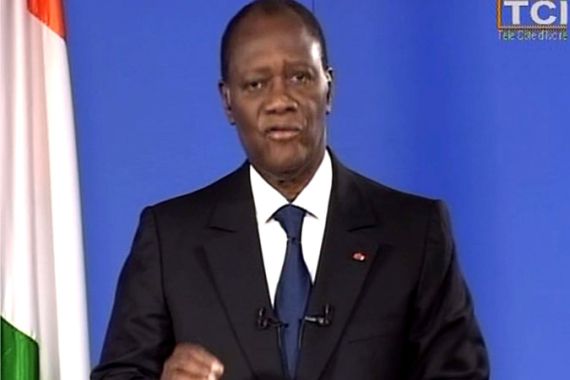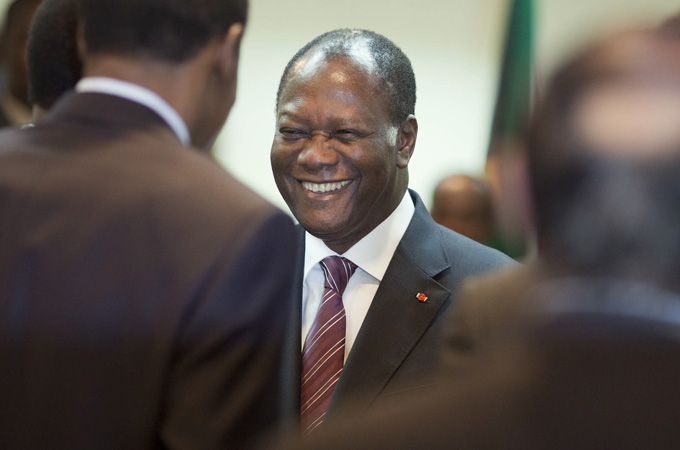Ivorian court confirms Ouattara as president
Constitutional council ratifies results of last year’s election, reversing decision that sparked four months of turmoil.

 |
| The constitutional council said it now accepted that Alassane Ouattara had won the presidential election [EPA] |
Ivory Coast’s constitutional council has ratified the results of last year’s presidential election showing that Alassane Ouattara won, reversing an earlier decision to reject them.
The court’s initial rejection of electoral commission results from the November 2010 poll sparked a more than four-month power struggle between Ouattara and incumbent leader Laurent Gbagbo.
Paul Yao N’Dre, the president of the constitutional council, said on Thursday that the top legal body now accepted Ouattara had won the election.
“The constitutional council … proclaims Alassane Ouattara president, takes note of decisions made by [him] and declares them all valid,” N’Dre announced to journalists in Abidjan, the country’s commercial capital.
“The constitutional council invites the president Alassane Ouattara to take an oath in front of an official audience as soon as possible. All decisions contrary to this one are null and void.”
Mass grave
The stand-off between Gbagbo and Outtara left thousands of people dead and displaced more than one million.
On Wednesday, Red Cross officials said a mass grave has been found at a field where children once played football in the Yopougon neighbourhood of Abidjan.
Franck Kodjo, one of the officials, said residents in Yopougon had told the aid group that about 30 bodies were buried in the field.
“This land will never be used by youth, will never again be suitable for children’s games,” he said. “It is a cemetery in the middle of the neighbourhood.”
The bodies were found as Yopougon, still held by forces loyal to Gbagbo, fell to government troops, according to authorities.
Yopougon was “the only area that remained [to be taken] and the entire district is now definitively occupied by us [FRCI troops],” Cherif Ousmane, who was in charge of the operation, told local television on Wednesday.
Armed groups close to Gbagbo had held the district even after he was arrested on April 11 with his wife and roughly 100 loyalists following a raid on his home in Abidjan.
Guillaume Soro, the prime minister who doubles as defence minister, said he had seen “streets littered with bodies” when he visited the sprawling district.
“At the militia headquarters we saw an improvised cemetery. I can imagine the slaughter that took place. I’m still under shock after seeing all these dead, all these bodies,” he said.
Quattara has promised to try to heal the nation’s deep divisions by setting up a South Africa-style truth and reconciliation commission.
He has also launched an investigation into Gbagbo and his inner circle for alleged abuses during the post-election power struggle.
The mass grave was found a day after Gbagbo urged supporters to drop political quarrels and help the country revive its economy.
Nightmare continues
At least 70 bodies have been collected by Red Cross workers since Tuesday from the nearby streets of Yopougon.
The district was the scene of the last pocket of heavy resistance since Gbagbo, president since 2000, was ousted last month by Ouattara’s troops.
While the west African nation, the world’s top cocoa grower, is showing early signs of returning to normal since Gbagbo’s ouster – with banks reopening and street traffic working again – the nightmare of war continues for some.
“The situation was terrible. There were militants who terrorised us,” said Stephane Bedjra, who lives with his wife and two children in a part of Yopougon, recently secured by Ivorian FRCI troops.
“They were armed and they did whatever they wanted. We lived like this until the arrival of the FRCI, who chased them from the area.”
Automatic gunfire could be heard from the direction of the lagoon, where army commanders said pro-Gbagbo fighters – many of them mercenaries from neighbouring Liberia – had been driven by a days-long sweep to disarm or kill them.
In short supply
Residents said food and water were in short supply after pillaging and heavy fighting left shops and infrastructure in disarray.
In Yopougon, a young girl attempted to drink water from a pipe near homes destroyed by recent explosions.
“I am crying because my five-year-old daughter who has never left my side has gone to Bangolo [village] to be with my mother, because the situation here is hard,” Christelle Gbelli, a Yopougon resident, said.
“I have stayed because we don’t have money for transport.”
Ouattara has said he expects to restore calm across the country by June, though FRCI commanders said it would be a matter of days before they defeated the remaining pro-Gbagbo fighters in Yopougon.
“The fighting is happening now toward Locodjro,” said Sargent Mory Hassan, standing near 13 prisoners, all stripped from the waist up. “But this will be all sorted out within a few days,” he said.
Security also remains a concern inland from the Atlantic coast, especially in the west where hundreds have been killed in ethnically driven violence and where armed men still operate.
This has prevented many of the region’s cocoa farmers from returning to their land in the world’s top cocoa producer, making up about a third of global supply.